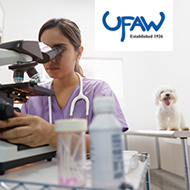
Funding available for projects which aim to improve animal welfare
The Universities Federation for Animal Welfare (UFAW) has announced that it is welcoming new applications for its Animal Welfare Student Scholarships.
Established in 1983, the student scholarship scheme aims to provide opportunities for students to explore their interest in animal welfare by funding short projects. More than 360 students have had their projects funded since the scheme began.
The federation is welcoming applications from undergraduates or equivalent who are studying agricultural, biological, psychological, veterinary or zoological sciences. However, UFAW also encourages students from other disciplines to apply if they are interested in carrying out an animal welfare-related project.
Projects must be relevant to improving the welfare of farm, laboratory, companion, zoo or wild animals. Successful applicants will be awarded up to £2,400 to cover subsistence and project expenses.
Responding to concerns about the impact of COVID-19 on the scholarships, UFAW’s CEO Huw Golledge said: “In these extraordinary times UFAW is doing its best to continue supporting animal welfare science and is processing applications for funding as usual.
“We understand that some of those awarded an Animal Welfare Student Scholarship may experience problems carrying out their project, and we are keen to help them overcome these issues.
“If their project is impacted by COVID-19 we ask them to contact us to discuss how we can help. We can offer no-cost extensions to grants in many cases and will consider any other adjustments which may help UFAW-supported activities to continue.”
The closing date for completed applications is Sunday 28th February 2021. For further information or to apply, please visit the UFAW website or email goodwin@ufaw.org.uk



 The latest
The latest